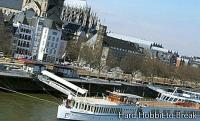
It is an authentic Portuguese jewel, among the many that our neighboring country has. When I think of how many treasures it holds, I marvel at how little we know Portugal. I speak of the Spanish, among whom it does not seem to me that traveling to the Portuguese country is too widespread.
In any case, if you can and you feel like it, don't limit yourself to discovering Lisbon this summer (another wonder!) And explore the Portuguese geography a little more. So you can discover small cities like Évora, which will seem magical to you. Historical, deep, cultural and convoluted. This is this city of narrow alleys where you can still feel the legacy of Romans and Muslims.
Pieces of history

Its beauty is such that it was declared, in a totally deserved way, World Heritage by Unesco. The center is a complex network of narrow streets resulting from Arab urban planning, experts say. Searching in Évora remains of the passage of the Romans, Visigoths or Muslims can become an experience.
Centuries ago, the Romans they extended their domain in the area. They built the first city wall in Évora, the close velha, of which only a few doors remain, despite the fact that it was preserved by the Visigoth and Arab peoples who arrived later. The Porta da Moura it is one of the vestiges. Another Roman remnant that remains in the city is the Aqueduto da Aqua da Prata, with more than 15 km. long, in very good condition thanks to the remodeling it underwent in 1552.
In the fourteenth century a second wall was built, which was called close nova, with a perimeter of almost 4,000 meters, of which a good part is preserved. And later, in the 17th century, the third wall was erected, close newest. That is why Évora is known as the city of the three walls.
Évora lived her Golden season between the XV and XVI centuries when the Portuguese kings chose it as their royal residence and it was considered the second city of the kingdom. Thereafter a slow decline began, a lethargy from which he seems not to have awakened. Of course, its beauty remains intact.
Évora | Património da Humanidade | Portugal (April 2024)
- Évora
- 1,230
















